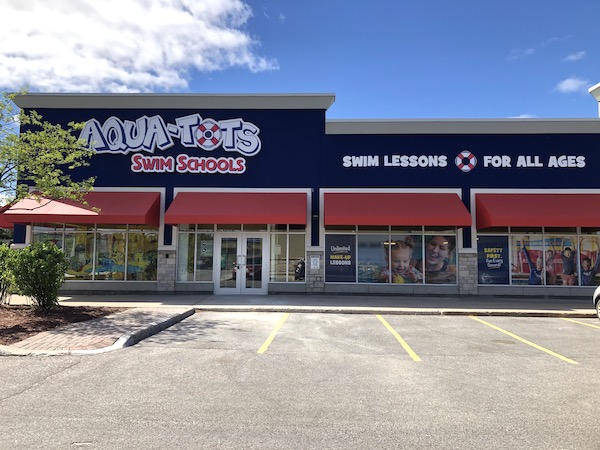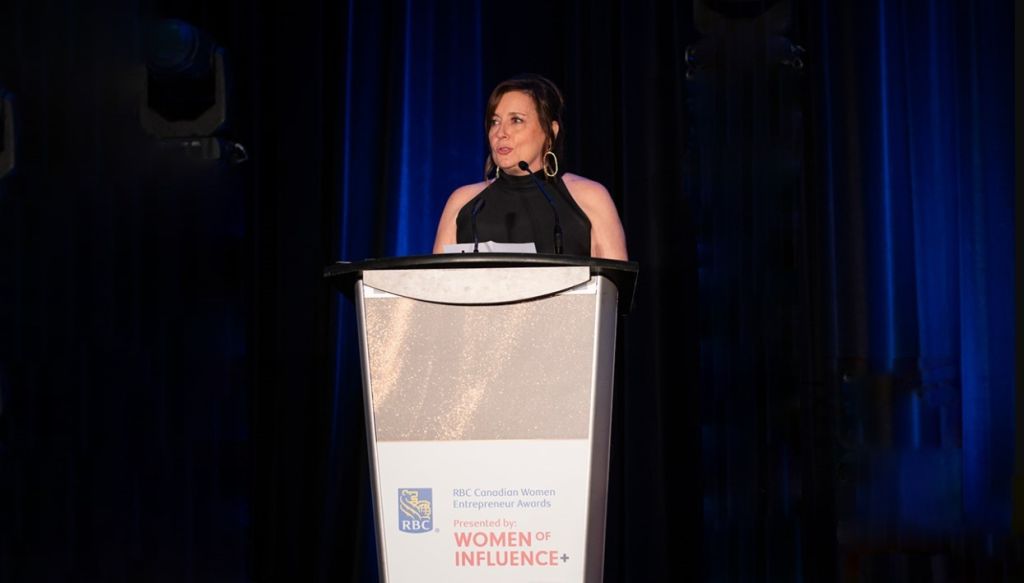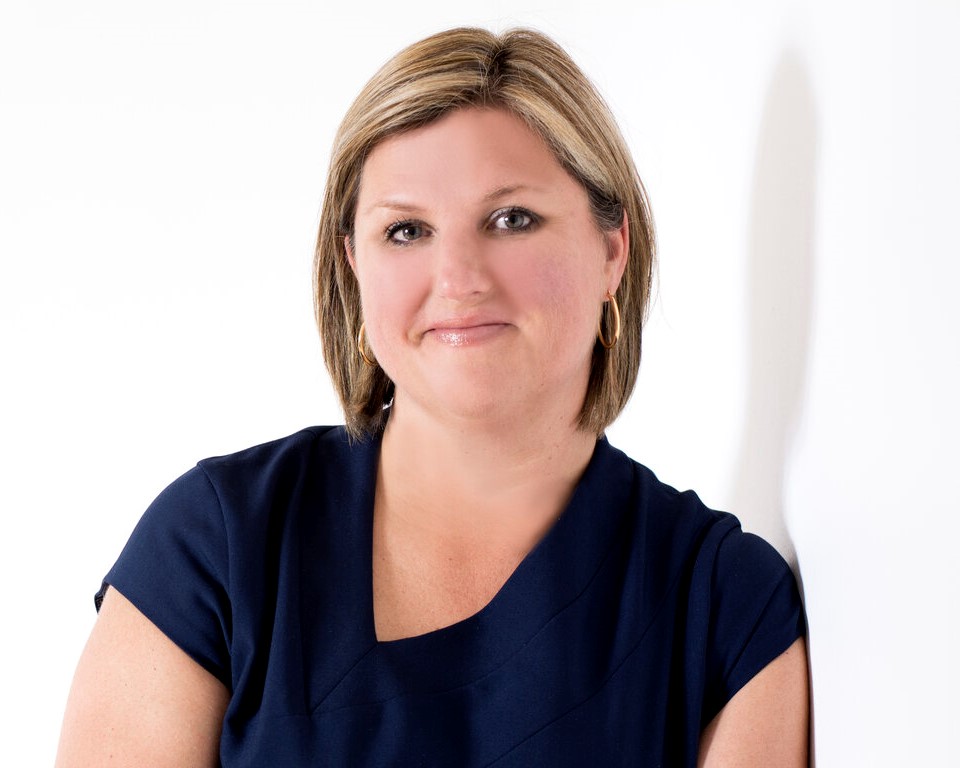Small Business Redefined: Matt and Brandi Bialek on How Blast-Off Fireworks is Taking Off
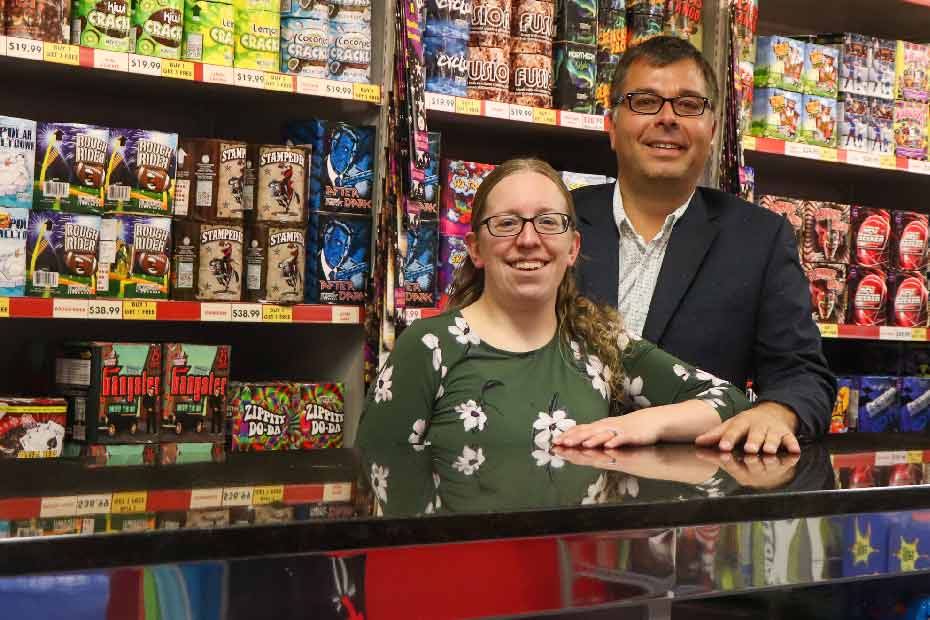
Published October 7, 2020 • 11 Min Read
In business, change is inevitable. But the COVID-19 pandemic brought about a level of change that businesses couldn’t foresee or plan for. Our #SmallBusinessRedefined series showcases small businesses that have found ways to reimagine their business through new opportunities – whether it’s through a new product, a new market, or a new way to fulfill. Learn how these Canadian businesses have pivoted to adapt, innovate and thrive in a changing and uncertain environment.
Matt Bialek and his wife Brandi never expected that their business, BLAST OFF Fireworks, would be where it is today. What started as a side-business out of a used school bus has turned into a thriving company with four divisions, multiple facilities, and a growing customer base. While their booming business hasn’t been unaffected by the COVID-19 pandemic, Bialek and team have been able to move forward by taking advantage of new opportunities, thanks to years of planning, innovative thinking, and old-school relationship-building.
Q: Tell us a bit about BLAST OFF Fireworks. How did you get started?
Bialek: Where we are today is not where we had envisioned being. This business really started as a weekend endeavor. I was in university and I desperately wanted to join my dad’s business –a grain brokerage in Manitoba. He insisted I go to school before joining the second-generation business. Wanting to do more than simply attend school, I decided to start selling and shooting fireworks as a weekend gig – with home-based being a used school bus, of all locations.
While in university, I settled on a career path in finance, earning two degrees – one in commerce and one in economics. The intention was to finish school, get a bit of experience in the financial industry, and return to the family business… but things ‘blew up’ (pun intended) in my fireworks endeavors. Needless to say, my family’s grain brokerage didn’t make it to the 3rd generation of family ownership.
Today, our organization is Western Canada’s largest fireworks company. We’ve branched out in a few different directions, and today, we have four unique divisions: BLAST-OFF Fireworks is our importation and distribution division, with nearly 4000 vendor-partners across the country. Red Bomb Fireworks is our retail division, with 5 retail locations in Manitoba and a national web presence. Here we focus on providing unparalleled retail experience for families and end-users of fireworks. Campfire FX is our manufacturing division that produces Canada’s only domestically produced campfire colorant, used to add extra effect to any wood-burning campfire. Finally, B2 Holdings is our real-estate division, specializing in commercial and industrial rental units in the greater-Winnipeg area.
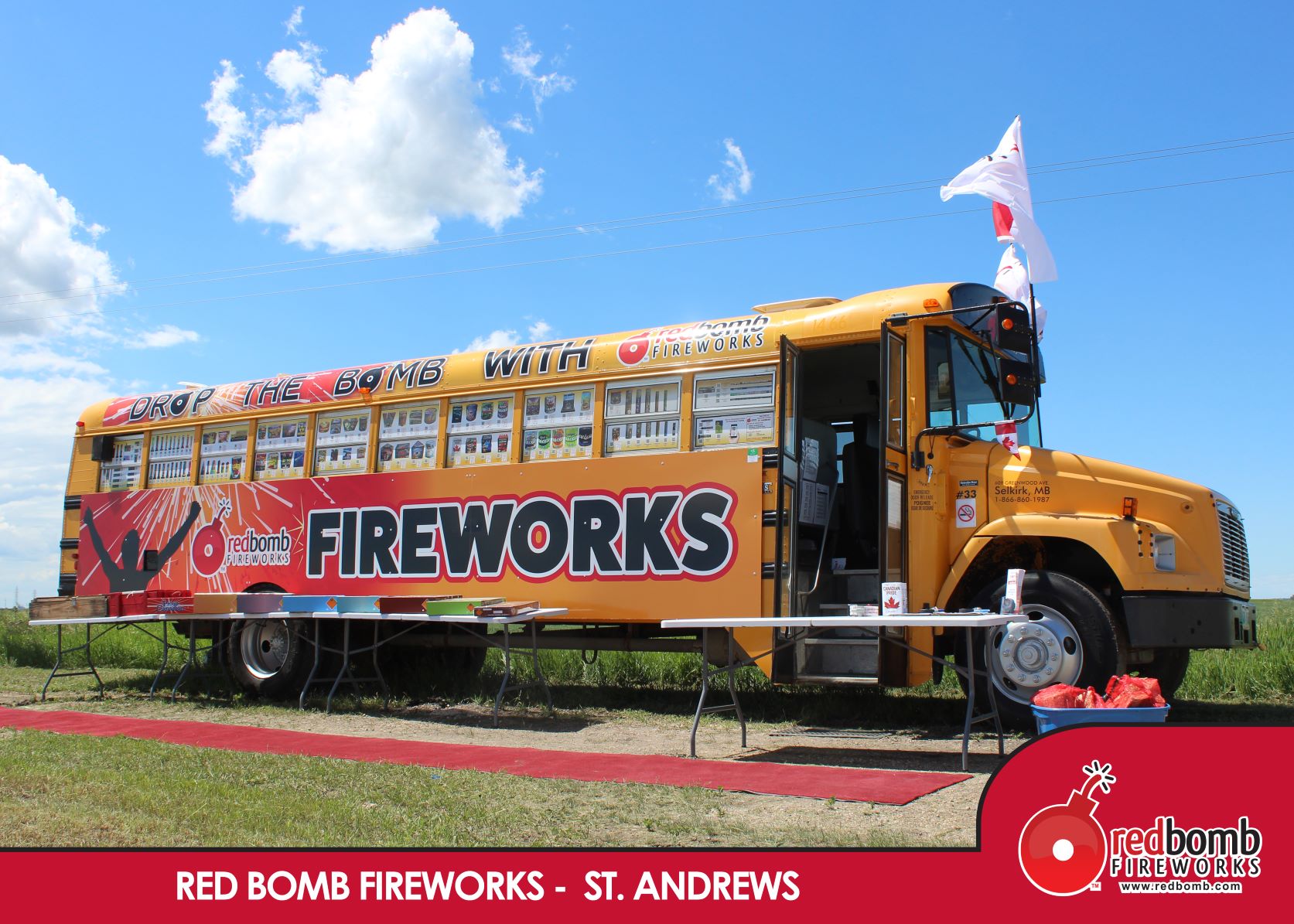
Q: What do you think is the secret to your success?
Bialek: Hard work, determination, customer focus, old-fashioned service, and LOTS of long hours.
We also hit the market at right time. This is our twenty-first year in business, and over the years we have seen a lot of change in the fireworks industry.
China has been one of the biggest factors to our success. Today, China is the centre of fireworks production in the world. Twenty-one years ago, fireworks weren’t as advanced, and our products were sourced mostly from the U.S. When China entered the market, they took Canada by storm. This transition has meant that we have fireworks today we never could have envisioned 10 or 15 years ago. The quality and availability of products today, far surpasses what used to be available, and our customers see this first-hand.
Our reputation and image is also very important to us. The fireworks industry is typically seen as a fly-by-night style of business. A pop-up store might sell fireworks for a week, then close for the year… never to be seen again. We flipped that model on its head in Manitoba. Our stores are extremely presentable – we are told we have the nicest stores in Canada for fireworks. When someone comes into our store, education and experience are just as important to us as what goes on in the sky.
Finally, relationships are HUGE in all four of our businesses. Our customers know that we’re real people. We still answer the phones with an actual receptionist. If you have a problem or concern, it is handled by a human-being, based in Canada. While we’ve invested heavily in technology, this technology assists mainly with back-end functions and tasks. Front-end tasks – where service is key – are still very much “hands-on” for our organization.
Q: How has business changed post-COVID?
Bialek: For our business, COVID 19 has been both a blessing and a curse. It’s been a curse in that we didn’t know what was coming down the pipe for quite a while. We had COVID-19 response plans for our retail and distribution divisions that were literally changing hourly, because the situation was evolving so quickly.
We also had to temporarily close retail locations, suspend operations and some of our staff were furloughed.
At this point in time, however, we have recalled the majority of our staff, and we have added many new faces to our team. Things could have been a lot worse. The silver lining with COVID 19 is that it forced us to look at every aspect of our business – even those areas that we had neglected in “times of good”. We looked for efficiencies, examined what we could do better – or for less – while maintaining our corporate standards and image. Because of the pandemic, we have streamlined operations this year. We are feeling a lot more comfortable and confident.
We were able to nimbly adapt and pivot. We asked ourselves how we could make the company work in these very trying times, and two key themes emerged: service and relationships.
In our retail division (Red Bomb Fireworks) we realized the need to provide a clean & safe environment physically, while pushing service to the next level. Older generations love one-on-one service, and connecting with them while shopping in-store has been extremely important (they absolutely crave socialization after being cooped up for the past few months). Younger generations, on the other hand, expect online service – from Google Chat availability to continuous Facebook updates and Messenger availability. My team has been available nearly 24-hours a day throughout the summer to handle retail traffic, questions, and information requests… regardless of how they come in. We’ve always believed that the best marketing comes organically – if you do things great / go above-and-beyond, customers will talk and do your marketing for you. With COVID, we simply took this philosophy to the next level and OWNED the fireworks space within the communities in which we operate (despite reducing mass-media advertising).
In our business-to-business wholesale division (BLAST-OFF Fireworks) we focused on relationships and total category management for our customers. Realizing that most of our re-sellers (convenience stores, gas stations) were facing extremely uncertain times, we kept in touch more frequently by telephone and offered to fully manage their fireworks programs (basically doing “everything” for our customers except ringing the products through their tills). While the intention was to ensure that our customers knew that they were taken care of, this extra contact generated a HUGE amount of goodwill and exponential sales. In today’s B2B climate, so many wholesalers are focusing solely on electronic (online) ordering options… this doesn’t build loyalty or guarantee repeat business. Admittedly, BLAST-OFF invested heavily in technology well before COVID, but when the virus took hold, we pivoted. Essentially, we started to use technology to do the mundane “sales” work for us (the stuff that nobody really puts a value on in a relationship), and our sales and marketing teams did the heavy lifting… going old-school and actually “talking” with our customers and developing one-on-one relationships. The payoff has been tremendous – we’ve more than made up all of the ground that we lost during the initial phases of COVID-19.
Q: You had to make difficult decisions. How did you communicate these with staff?
Bialek: We had very open communication channels as COVID hit. We would issue a daily update by email. Some days, our communication was extremely frequent (nearly hourly), because of the rapid changes to our plans because of the evolving situation.
As we worked through the COVID pandemic, we made plans in a communal fashion – all staff had input. We held in-person and telephone meetings, respecting social distancing.
When we recalled our furloughed staff, we relied on telephone conferences and Microsoft Teams to update staff on where the company was heading, and what their roles would be in our re-opening. There was a lot of direct, old-school communication. We believe in talking to people. This way of doing things reduced a lot of anxiety.
Q: With so much of your product coming in from China, how has your supply chain been affected?
Bialek: 99% of the world’s fireworks supply comes out of China. Not just because of the reduced production costs, but because the Chinese are fireworks experts – they have been working with fireworks for thousands of years. The Chinese literally invented fireworks.
Last summer, the Chinese government started to enact more stringent safety controls within fireworks production. One example of this was the implementation of temperature controls governing fireworks production – if outside temperatures exceeds the 25 degrees, all factories are mandated to close. 2019 was one of the hottest summers in China and all production was halted for several months. Factories re-opened in the fall and started to ramp up production, but in December there were two factory explosions, which then halted production from December to January.
Just as we got back online with production, COVID broke in China, which shuttered everything – from factories to logistics networks.
While factories have slowly resumed production, some products that were ordered in 2019 – which should have been here in March – still have not yet arrived.
Q: How have you been able to manage through such disruption?
Bialek: Luckily, we plan and manage our inventory carefully, so we have substantial reserves of inventory to fill unexpected spikes in demand. In most cases, our customers won’t see significant out-of-stocks.
While traditional business analysists might consider our inventory model to be “heavy” our “overly capital intensive”, the state of our global supply chain dictates that we need to plan ahead for issues, making sure that we can take care of our customers at all times. To accomplish this, it’s not unusual for our organization to inventory up to a year’s supply of product at our 20-acre Distribution Campus.
We run an old school business. Our credo is that “you can’t sell it if you don’t have it”. While there is so much emphasis on Just-In-Time inventory these days, this just doesn’t work for our industry. There are so many variables – weather, shipping, an unforeseen pandemic – we need to plan out 12 to 18 months in advance to maintain the level of inventory we need.
Q: Have you taken advantage of any of financial support options available?
Bialek: Yes. Josh, our RBC Account Manager, reached out the moment things started to emerge with COVID-19. RBC offered assistance and support and called us with a plan to keep things running and afloat. With the government programs in a constant state of flux, our RBC plan gave us confidence in how we could weather this storm together.
We also qualified for the Canada Emergency Benefit Account (CEBA), which Josh set up for us, as well as the Canadian Emergency Wage Subsidy (CEWS).
Q: You have seen a lot of growth in your retail division. Can you explain why it has thrived during this time?
Bialek: With COVID we saw a huge growth in the number of people getting fireworks for birthday parties, gender reveals, and backyard family events. People wanted a break from reality and needed an escape from the daily grind… all while respecting physical distancing and remaining safe.A fireworks show was the perfect antidote.
Demand is forecast to remain high throughout the remainder of 2020, because most community events – including fairs and exhibitions – have been cancelled. People will visit their local store for fireworks as they transition from big gatherings to more intimate family and neighborhood parties with fireworks, based on community guidelines.
This article is intended as general information only and is not to be relied upon as constituting legal, financial or other professional advice. A professional advisor should be consulted regarding your specific situation. Information presented is believed to be factual and up-to-date but we do not guarantee its accuracy and it should not be regarded as a complete analysis of the subjects discussed. All expressions of opinion reflect the judgment of the authors as of the date of publication and are subject to change. No endorsement of any third parties or their advice, opinions, information, products or services is expressly given or implied by Royal Bank of Canada or any of its affiliates.
Share This Article



